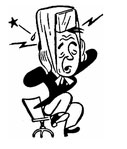
P.C. Squared
POLITICAL CORRECTNESS IN THE CATHOLIC PEACE MOVEMENT
A necessary preface: This is written with regret, not in a spirit of confrontation. It could scarcely be otherwise. I take great pride in my “connections” with the Catholic peace movement, and in particular with Pax Christi USA — first as co-founder, then as long-term officer, and twice as recipient of the organization’s honorary citations. The issue I address is one I have been arguing for more than five years without being able to open it up for “in house” discussion and consideration by the membership. If I now feel obliged to bring it to “outside” attention and discussion, it is only because I consider the issue too important to pass ignored.
In no sense does my doing so imply a lessening of commitment to an organization I regard as the foremost expression and greatest hope of the Catholic peace movement and the ideals to which I have devoted my more than 50 years of personal witness, speaking, and writing. Moreover, I intend to remain a member and active supporter for whatever time remains for me. Nor, it should be noted, does this essay imply a lack of respect for those who differ with me.
+++
The issue under consideration relates to Pax Christi’s policy requiring the use of inclusive language in its communications and publications. My objection is not to the policy, but to its application. I was a member of the National Council when the policy was adopted. I voted for it, and even argued for it. I still support it as a general and official policy — with one crucial exception.
I reject as an abuse of editorial privilege and an act of literary violence any decision to “censor” or impose “correction” upon material or references presented as an exact quotation from previously published writings or statements. I insist that in claiming direct attribution — either by the use of quotation marks or identification as an “excerpt” or “reprint” — both scholarly and editorial integrity demand that the material used be presented exactly as originally spoken or published.
You May Also Enjoy
Review of Justice, Peace, & Human Rights: American Catholic Ethics in a Pluralistic Context... The Reshaping of Catholicism... Sophisticated Rebels: The Political Culture of European Dissent, 1968-1987... A Rocking-Horse Catholic... Caryll Houselander: That Divine Eccentric... In the Name of Jesus: Reflections on Christian Leadership... and Starting Out in the Thirties
Our Vast Pudding, Who Art in Heaven, Muddled Be Thy Name... Every Man a King... Give an Inch and They'll Grab for the Whole Nine Yards... When the Wedding Bell Rings Marriage's Knell... Multiple-Choice Question... God, the Original Hate Criminal
Bulk Fatherhood... The Price of Praise... Dirty Cleaning... Explosive Easter Egg Hunt... Blind Ambition... Fashion Infraction... Zombie Apocalypse... Anyone but Hitler

